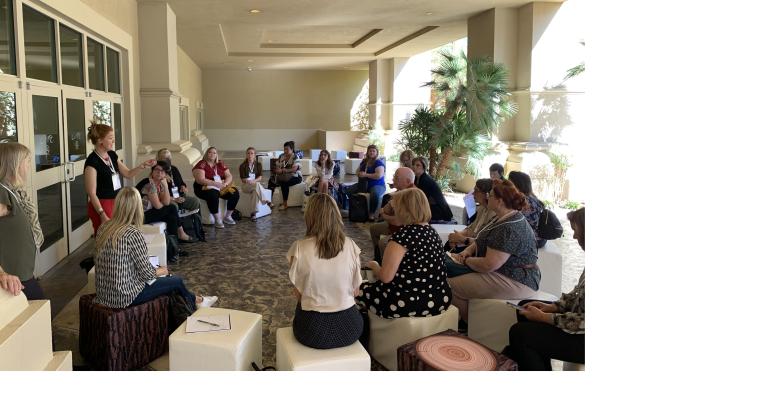With more than 4,000 planners and 7,000 suppliers attending mid-October’s IMEX America show in Las Vegas, finding a time and place for quiet conversation in Mandalay Bay Convention Center was a tough task. But for about 25 life-science planners, a covered patio just outside the center’s prefunction space provided just the right atmosphere for a focused, 75-minute get-together among people with common goals and challenges.
Led by Virginia De Vischer, medical-meetings liaison with Destination Canada; Bonnie Grant, head of PHL Life Sciences within the Philadelphia CVB; and Becky Cavanaugh, global medical meetings director for Cadent, the interactive session began with Cavanaugh noting that physicians are invited to an average of 27 events a year, of which they attend perhaps four or five. “Given that we planners have just eight to 12 weeks to plan our HCP-focused meetings when we really need 16 weeks to do it best,” she said, “how do we get physicians to choose our event as one of the few they will attend that year?”
De Vischer provided one suggestion that could work for both smaller and larger HCP events. “Destination choice is important, and it can be a data-driven exercise” beyond the destination simply being desirable for HCPs (and their spouses) to visit. “Your research could focus on the number of academic and non-academic research institutions in a city, the number of related companies located there who can provide speakers or be event sponsors, and the amount of financial or logistical support the local government provides for life-science meetings.” Those first two elements can be promoted in marketing materials to potential attendees, while the third makes it easier to deliver a memorable experience to attendees.
From a different angle, Bonnie Grant noted that “groups that choose to deal with a specific medical condition among that destination’s population can leave a strong and lasting legacy there,” which appeals to many HCPs. Also, “if you can bring in middle-school and high-school students to experience part of your event, you could inspire them about medicine and literally change the course of their lives.”
 When it comes to planning investigator meetings after the Covid pandemic, Cavanaugh (in photo) said that despite the ability to bring in more HCPs via a hybrid-event format, “we are getting away from that and going back to fully in-person because the engagement of remote attendees just is not what we need it to be. It’s tough to get speakers to alter their approach to really engage the virtual attendees. And the medical demonstrations are not the same for both audiences—the hands-on demos for in-person attendees can’t be adapted well for virtual attendees.”
When it comes to planning investigator meetings after the Covid pandemic, Cavanaugh (in photo) said that despite the ability to bring in more HCPs via a hybrid-event format, “we are getting away from that and going back to fully in-person because the engagement of remote attendees just is not what we need it to be. It’s tough to get speakers to alter their approach to really engage the virtual attendees. And the medical demonstrations are not the same for both audiences—the hands-on demos for in-person attendees can’t be adapted well for virtual attendees.”
To close the session, Cavanaugh broached a topic that often remains unspoken despite its importance to planners. When it comes to holding sustainable meetings, she said that “executive stakeholders are not interested unless it’s cheap.” As a result, she advises planners to get information from host venues, F&B vendors, transportation companies, technology providers, and other suppliers about how previous meetings they handled were able to minimize waste and carbon output, and whether it required any additional costs or workarounds for the host organization. “To get executives on board, you’ll have to make the financial case,” she noted.





